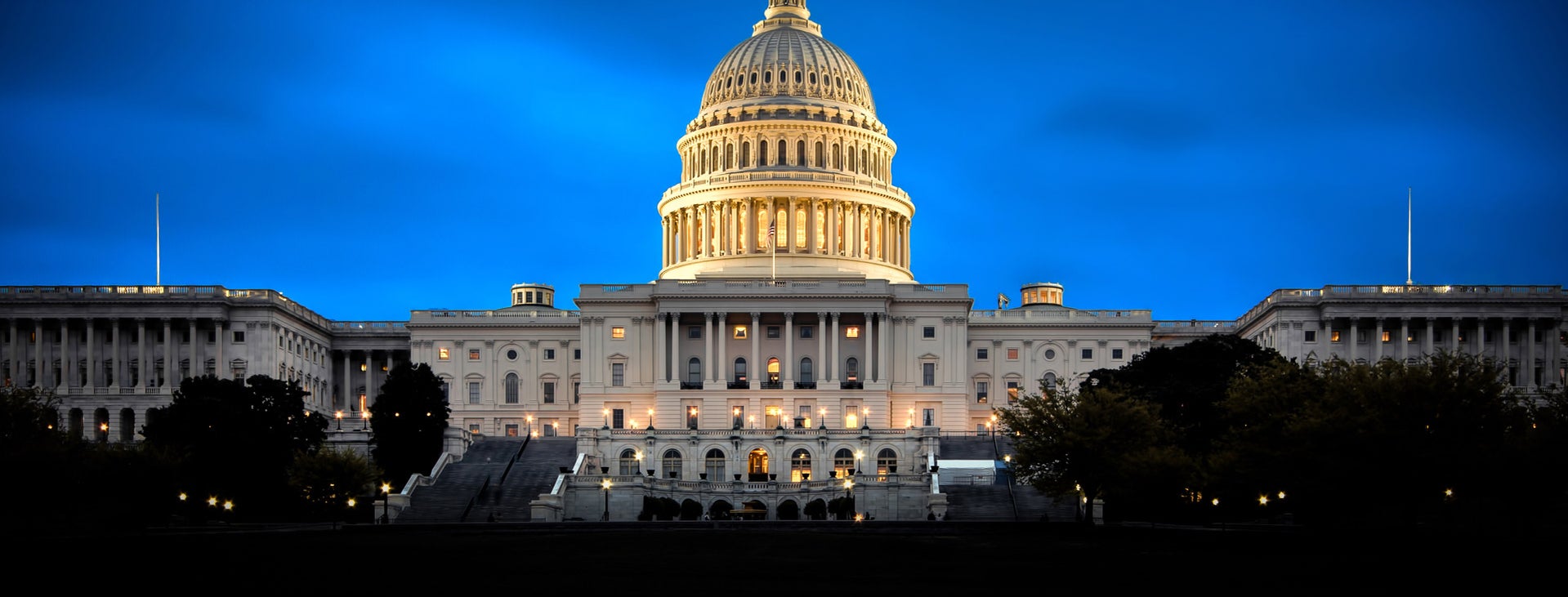
18 December 2024 • 19 minute read
Horizon – News and Trends in Sustainability Law

Contents
- Implications of the US presidential election
- Will agreement among multilaterals remain elusive? A view from the COPs
- A landmark climate change case in The Hague
- Practical thoughts on the move to mandatory reporting
- Regulators increase focus on greenwashing
- Deploying the antitrust laws against sustainability initiatives
- Companies and insurers will work together to customize risk financing needs
- For financial services companies, sustainability enforcement and private litigation will continue
- Supply chain integrity is even more important
- Changes ahead for the plastic packaging industry
- Calendar - key reporting deadlines, coming events
Implications of the US presidential election
The eyes of the world will be on the US as Donald Trump returns to office. The President-elect has pledged to roll back a myriad of environmental regulations, repeal the Inflation Reduction Act, and turn the focus of US energy policy back to fossil fuels. The SEC Climate Rule may be vacated, and it is expected that the US will again withdraw from the Paris Agreement. More largely, however, many observers are commenting that while the next Administration may slow the transition to clean energy, it will ultimately not be able to stop it. On the “S” side of sustainability, we can expect the Administration to roll back diversity and inclusion initiatives, such as by reinstating its 2020 ban on certain D&I initiatives for federal contractors, and the incoming SEC will not appeal the Fifth’s Circuit’s recent overturning of Nasdaq’s board diversity rules. In 2025 and beyond, states will have a greater role to play, and key states to follow include California, Illinois, New York, and Washington. And, as a matter of practicalities, US-based multinationals still need to comply with sustainability regulations around the world, including those mandating sustainability disclosures, such as the EU’s CSRD and CSDDD and California’s SB 253 and SB 261.
Will agreement among multilaterals remain elusive? A view from the COPs
2024 was a critical year for multilateral efforts to tackle global environmental challenges. Agreement was often elusive, but 2025 will give multilaterals further opportunities. Baku, Azerbaijan hosted COP29, the 29th session of the annual climate conference, in November with high expectations for carbon markets and climate finance. International negotiators delivered the latter with overdue rules on the use of carbon credits under the Paris Agreement. But that milestone was overshadowed when the much-anticipated deal for developed countries to fund climate efforts in developing countries seem to leave few parties happy. The New Collective Quantified Goal (NCQG) on climate finance to collectively “mobilize” $300 billion annually by 2035 is triple the prior commitment, but many still regard it as insufficient.
Looking ahead, countries are expected to submit updated commitments under the Paris Agreement – known as nationally determined contributions, or NDCs – in February 2025. The updated NDCs will send a strong signal about whether the Paris Agreement’s long-term goal of limiting global warming to 1.5°C over pre-industrial levels remain within reach and will be a critical topic for negotiations at COP30 in Belém, Brazil.
Results in other forums were decidedly mixed as well. The November biodiversity COP16 in Cali, Colombia, had some successes but concluded without fulfilling its mandates; delegates will reconvene in February 2025 in Rome to wrap up unfinished business. Then this month, the fifth and intended final meeting of the Intergovernmental Negotiating Committee (INC-5) on plastic pollution concluded on December 1 with negotiators unable to reach a deal on an internationally binding treaty to curb plastic pollution. INC-5 will reconvene in 2025 to try again. Also this month, the desertification COP in Riyadh, Saudi Arabia failed to deliver an agreement for addressing drought but made some progress on other issues, such as including non-country stakeholders in the negotiation process. A strong outcome from this COP could help to assuage concerns about the long-term effectiveness of environmental multilateralism.

The ICJ’s largest case ever is exploring “the obligations of States in respect of climate change”
On December 2, the International Court of Justice (ICJ), the main judicial arm of the United Nations, began two weeks of hearings in The Hague in a landmark climate case seeking the ICJ’s advisory opinion on “the obligations of States in respect of climate change.” The case, brought by island nations whose very existence is threatened by rising seas, seeks to answer two questions: Do developed nations have an obligation under international law to protect the environment from human-caused climate change? And what are the legal consequences for governments when their inactions harm the environment? This case, the largest the ICJ has ever heard, is being closely watched for its potential impact on the international community’s efforts to come up with a legal framework for addressing climate change and, more immediately, for its impact on the numerous climate change lawsuits going forward worldwide. Once hearings conclude, the court will likely take several months to issue its opinion.
Practical thoughts on the move to mandatory reporting
This is an interesting transitional time, where many states around the world are moving toward mandatory corporate sustainability reporting regimes. We are closely watching the latest developments in these jurisdictions:
- California’s landmark carbon-emissions disclosure law (SB 253) requires companies with over $1 billion in revenue operating in the state to report their greenhouse gas emissions starting in 2026, with Scope 1 and Scope 2 disclosures, and Scope 3 disclosures beginning in 2027. While the law imposes penalties of up to $500,000 for noncompliance, the California Air Resources Board (CARB) announced on December 11 it will not enforce the rules in the first reporting year if companies make a “good faith effort” to comply, citing the need for more time to establish data collection systems. This decision has sparked criticism, particularly from state Senator Scott Wiener, who argues that CARB is undermining the law’s intent. Despite delays and legal challenges, the law could set a national standard for emissions reporting, influencing US and international corporations alike.
- Australia’s mandatory climate-related financial disclosure regime goes into effect on January 1, 2025. Many large entities will be required to include 2025 climate-related data in their annual reports filed in 2026; the law also phases in implementation for smaller entities in 2026 and 2027.
- Canada will mandate climate-related financial disclosures for large, federally incorporated private companies through amendments to the Canada Business Corporations Act and is advancing its plan to deliver “Made in Canada” sustainable investment guidelines.
- Mexico will require all companies that prepare financial statements under Mexican Financial Reporting Standards (that is, Mexican GAAP) to include sustainability information in their financial statement notes starting in 2025.
- Several European countries, including Bulgaria, Croatia, Czechia (Phase one), Denmark, Finland, France, Hungary, Ireland, Italy, Lithuania, the Netherlands, Romania, Slovakia, Spain, and Sweden, have transposed the EU CSRD into national law, replacing the former Non-Financial Reporting Directive and, in some cases, expanding certain CSRD thresholds and requirements. Switzerland’s proposed amendments to the Swiss Code of Obligations would align Swiss rules with international systems, especially the EU’s CSRD, and increase the number of reporting companies from the current 300 to around 3,500.

Regulators increase focus on greenwashing
The global trend toward greater corporate accountability is also manifesting in the rising attention being paid to greenwashing. Regulations aiming to protect consumers from organizations’ misleading claims about their sustainability practices are spreading. Interestingly, the attention being paid to greenwashing is not just an enforcement trend: the public is increasingly skeptical of companies’ sustainability claims and is ready to call out those whose claims they doubt, and consumers and consumer protection groups are also bringing various greenwashing lawsuit against companies. With the rise of corporate disclosure regulation, we anticipate an increase in greenwashing litigation. In the absence of regulatory consensus in the US, courts will have a major role to play.

Deploying the antitrust laws against sustainability initiatives
The United States’ status as a global outlier with respect to the use of antitrust laws to threaten industry-level sustainability issues is unlikely to change in the second Trump Administration. In the Biden Administration, senior leaders at the two federal competition enforcers – the DOJ’s Antitrust Division and the Federal Trade Commission (FTC) – adopted a studiously neutral tone on these issues, maintaining there was no exemption to federal antitrust laws for sustainability and other sustainability initiatives. In a notable divergence from prevailing enforcement trends around the world, neither agency made any effort to promulgate guidance that would clarify the boundaries between acceptable industry collaboration on sustainability issues and potentially anticompetitive conduct.
Even if they had attempted this, however, it would not have bound the numerous state attorneys general who exercise authority independently from the federal agencies. Several Republican state-level enforcers have challenged industry-level sustainability initiatives as potentially anticompetitive. Further, Republicans in Congress remain hostile to these initiatives.
We expect this status quo to continue. State AGs will continue to lead enforcement efforts, and with Republicans set to control both the House and Senate, it is possible that congressional Republican attacks on "climate cartels" will ramp up even further. We also expect that federal agencies could be even more hostile to ESG than they were in the first Trump Administration. The President-elect’s nominee to chair the FTC has pledged to “[i]nvestigate and prosecute collusion on … sustainability,” echoing Project 2025's recommendation that federal antitrust enforcers “set up an ESG/DEI collusion task force to investigate firms—particularly in private equity—to see if they are using the practice as a means to meet targets, fix prices, or reduce output.” Find out more about this developing area of law by contacting Carsten M. Reichel and Vic Domen.
Companies and insurers will work together to identify practical ways to customize risk financing needs
Losses resulting from natural catastrophe events continue to rise, particularly with respect to secondary perils, such as flood, wildfire, convective storms, extreme heat, and drought, which also result in supply chain disruptions and affect health and longevity. The impact of these losses has been felt most acutely in the rising cost of property and agricultural insurance. That is a trend that is likely to continue, while carriers continue to innovate loss prediction, risk segmentation and pricing, and product design. Businesses, in the meantime, are addressing rising costs through loss prevention, risk mitigation, and more customized risk financing solutions and structures. Just as importantly, businesses will continue to align with the insurers to promote adaption and resiliency measures and programs in partnership with the public sector to reduce losses – which, ultimately, is the only viable means of maintaining the availability and affordability of insurance. Find out more about these developments by contacting Kathleen Birrane.

For financial services companies, sustainability enforcement and private litigation will continue – under traditional theories of securities law violations
Even as consumers are increasingly interested in sustainability-related investment products, we anticipate that the incoming Administration will roll back certain Securities and Exchange Commission (SEC) and Department of Labor (DOL) sustainability initiatives related to financial services promoted by the current Administration. Nevertheless, we expect continued enforcement and private litigation against financial services companies related to such issues as greenwashing.
SEC regulatory rollback: We anticipate that under the new Administration, the SEC will continue the SEC’s stay on its Climate Disclosure Rules, and it may seek to amend the Rules to take a more principles-based approach or withdraw the Rules entirely, mooting current legal challenges. We also expect other regulatory rollbacks – most notably affecting the SEC’s still pending 2022 proposal to enhance sustainability investment practice disclosures.
The DOL Fiduciary Rule: In 2022 the DOL finalized its rule allowing retirement plan fiduciaries to consider sustainability factors when selecting investments and investment courses of action and when exercising shareholders rights such as proxy voting. The validity of the rule is still facing legal challenges. We anticipate that the new Administration may not defend the rule in the face of those challenges, and we also anticipate that the incoming Administration will require fund managers to focus solely on pecuniary factors.
Enforcement and litigation will continue: We anticipate that the SEC and investors will continue to pursue claims against financial services firms that make material misrepresentations or omit material facts related to sustainability issues. Such actions do not require any particular sustainability-focused regulatory regime to succeed; they can be supported by traditional securities fraud, breach of fiduciary duty, and other well-established approaches.
A quick word about the states: We anticipate that even as the federal government rolls back sustainability regulations applicable to financial services companies in 2025, at least some states will step in to fill the gap, while others will follow the lead of the federal government. Financial services companies will face increased challenges in navigating a patchwork of state-level sustainability-related regulations.
Learn more about these evolving trends by contacting Deborah R. Meshulam.

Supply chain integrity is increasingly important
Expectations regarding supply chain integrity are expanding as regulators increasingly scrutinize companies for the environmental soundness of their business practices and their record on human rights throughout the value chain. We are particularly watching these three laws:
- The EU’s new forced labor regulation, mandating the removal of goods linked to forced labor from the EU market. The regulation covers products imported into the EU as well as products made in the EU for export, and it affects companies of any size.
- The postponed enforcement of the EU Regulation on Deforestation-Free Products (EUDR), which prohibits the import of commodities such as soy, beef, palm oil, and coffee unless they are certified as deforestation-free. The EUDR’s due diligence obligations were set to go into effect on December 31, 2024, but in November the European Council approved delaying compliance with those obligations by one year, and on December 17, the European Parliament voted overwhelmingly in favor of that change. Companies should closely monitor this development to ensure compliance. See our alert, European Union Deforestation Regulation: What US companies should know.
- Canada’s Supply Chains Act, which requires certain entities and government institutions to report annually on their efforts to prevent and reduce risks of forced labor and child labor in their supply chains. The deadline for the next cycle of reports is May 31, 2025. On November 15, Public Safety Canada released updated guidance with helpful clarifications on businesses’ reporting obligations under the Supply Chains Act.
Changes ahead for the plastic packaging industry
Single-use packaging producers have a lot on their plate in 2025, which may signal a turning point in how the industry is regulated. Most critically, extended producer responsibility (EPR) laws will go into effect in Colorado, Oregon, and California, with more such laws on the horizon. EPR laws aim to make packaging producers responsible for the costs of managing waste and typically require producers to fund disposal efforts, often through a nonprofit producer responsibility organization (PRO), which producers are required to join. All three states designated the Circular Action Alliance (CAA) as the PRO for administering their EPR programs, with producers required to join at various points in 2024. Once these laws are fully in effect, producers will have obligations to report on the volume of covered materials, pay into collective funds, and contribute to source-reduction efforts.
California regulators are tasked with adopting final implementation rules for the state’s EPR law (SB 54) on January 1, 2025, and Minnesota regulators must adopt rules to implement specified reduction, reuse, recycling, and composting rates no later than May 22, 2025. But among the most pressing deadlines will be Oregon’s, where producers must submit their initial supply reports and begin paying fees by March 31, 2025, with no sale of covered material permitted after July 1, 2025 unless the producer is in compliance.
In addition to these developments, the plaintiffs’ bar has become particularly aggressive about trying to blame plastic pollution in part on producers’ promotion of recycling – including recyclability claims like the ubiquitous “chasing arrows.” Some jurisdictions are passing laws that echo this approach, such as SB 343 in California, which will ban recyclability claims on products and packaging unless a state agency has first found the product or packaging to be sufficiently recycled within the state. Meanwhile, the EPA’s newly released National Strategy to Prevent Plastic Pollution provides perspective for the industry and input for states as they develop plastics strategies. All told, pressures continue to mount for the packaging industry even as the demand for packaging remains strong.
Calendar
Key global reporting deadlines
Click on each icon to learn more.
Deadlines
- US: California Transparency in Supply Chains Act – annually based on the company’s internal annual publication deadline
- US: California Social Compliance Audits – January 1, 2025
- Canada: Bill S-211, Fighting Against Forced Labor and Child Labor in Supply Chains Act – annually on May 31
- Mexico: Mexican Sustainability Reporting Standards (NIS A-1 and B-1). The standards will substantively apply from January 1, 2025, onwards.
- EU: Taxonomy Regulation
- NFRD obliged companies – financial years starting on or from January 1, 2024 (with reports due in 2025/2026)
- Large undertakings and parents of large groups – financial years starting on or from January 1, 2025 (with reports due in 2026/2027)
- EU: Corporate Sustainability Reporting Directive (CSRD)
- Large EU Public Interest entities (NFRD obliged) – January 1, 2024 (with reports due in 2025) and then annually
- Large EU undertakings and parents of large EU groups – January 1, 2025 (with reports due in 2026) and then annually
- Small and medium-sized enterprises (SMEs) – January 1, 2026 (with reports due in 2027) and then annually
- Non-EU parent companies – January 1, 2028 (with reports due in 2029) and then annually
- 2029 for all other companies that fall within the scope of the CSRD.
- EU: Deforestation Regulation (EUDR)
- Large EU operators and traders – December 30, 2025
- Micro and small enterprises – June 30, 2026
- EU: Corporate Sustainability Due Diligence Directive (CSDDD)
- 2027 for companies with 5,000+ employees and €1.5 billion
- 2028 for companies with 3,000+ employees and €900 million net turnover and
- 2029 for all other companies that fall within the scope of the CSDDD.
- UK: Modern Slavery Act, Transparency in Supply Chains Act – annually. Companies should publish their statement as soon as possible after their financial year end, which is expected to be, at most, within six months of the organization’s financial year end. Companies may wish to publish these statements at the same time as they publish other annual accounts.
- Germany: Act on Corporate Due Diligence Obligations in Supply Chains
- Phase 1 – June 1, 2024
- Phase 2 – annually on January 1, 2025
- Switzerland: Due Diligence and Transparency in Relation to Minerals and Metals from Conflict-Affected Areas and Child Labor – annually on June 30
- Norway: Transparency Act – annually on June 30
- Australia: Modern Slavery Act
- If the business reporting date is based on calendar year (ie, January 1 to December 31), then the reporting deadline is annually on June 30
- If the business reporting date is based on Australian financial year (ie, July 1 to June 30), then the reporting deadline is annually on December 31
- If the business reporting date is based on Foreign Financial Year – including United Kingdom and Japan (ie, April 1 to March 31) – then the reporting deadline is annually on September 30
- Australia: Climate-Related Financial Disclosures
- Group 1: January 1, 2025 is start date for reporting first year’s data, due in 2026/2027
- Group 2: July 1, 2026 is start date for reporting first year’s data, due in 2027/2028
- Group 3: July 1, 2027 is start date for reporting first year’s data, due in 2028/2029
- Singapore: both SGRX-listed and large non-listed companies must file annual climate-related disclosures, starting with FY 2025. Requirements for smaller issuers are being revised.
Coming events
- The 16th session of the Conference of the Parties to the Convention on Biological Diversity will reconvene February 25-27, 2025 in Rome.
- SF Climate Week will take place April 19-27, 2025 in San Francisco.
- The 2025 UN Ocean Conference will be held June 9-13, 2025 in Nice, France.
- Climate Week NYC will take place September 21-28, 2025 in New York City.
- The 2025 United Nations Climate Change Conference (COP 30) will be held November 10-21, 2025 in Belém, Brazil.







